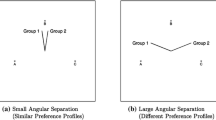
Overview
- Introduces a new model addressing research questions that involve both social structure and value orientations on party choice
- Thoroughly considers major determinants of the party choice of all voters
- Provides a comprehensive geographical coverage analyzing 18 European countries
Part of the book series: Palgrave Studies in European Political Sociology (PSEPS)
Access this book
Tax calculation will be finalised at checkout
Other ways to access
About this book
This book analyses the impact of socio-structural variables, such as social class, religion, urban/rural residence, age and gender, on influencing an individual’s voting preferences. There have been major changes in recent decades both to social structure and how social structure determines people’s voting behaviour. There has also been a shift in value orientations, for example from religious to secular values and from more authoritarian to libertarian values. The author addresses the questions: How do social structure and value orientations influence party choice in advanced industrial democracies?; To what extent is the impact of social structure on party choice transmitted via value orientations?; To what extent is the impact of value orientations on party choice causal effects when controlled for the prior structural variables? The book will be of use to advanced students and scholars in the fields of comparative politics, electoral politics and political sociology.
Similar content being viewed by others
Keywords
- socio-structural variables
- social class
- religion and politics
- age and political preference
- gender and politics
- voting preferences
- voting behaviour
- influences of party choice
- comparative European politics
- European Values Study 2008
- Party choice and social structure
- Old Politics and New Politics
- democracy
Table of contents (8 chapters)
-
Front Matter
-
Back Matter
Reviews
“Knutsen's meticulous probing into public political opinion and partisan choices in 18 European democracies conveys detailed insights into the structure of popular beliefs and partisan alignments at the end of the first decade of the new millennium. He is careful to highlight both common patterns pertaining across the entire set of postindustrial polities as well as persistent differences between groups of countries. Political cleavages are crystallized around structural social divides, albeit they are most sharply configured around party families that did not exist in the post-World War II order. And, pace much talk about political dealignment, it is in the most advanced postindustrial polities that show the strongest structuring of the vote. Knutsen's study may serve as foundation from which much fruitful research can be launched.” (Professor Herbert Kitschelt, Duke University, USA)
Authors and Affiliations
About the author
Oddbjørn Knutsen is Professor of Political Science at the University of Oslo, Norway. His research interests include comparative politics with a special focus on Western Europe, political sociology and electoral behaviour, value orientations and ideology, and methodology and statistics. He has published comparative articles in international journals on value change, value orientations and party choice, political cleavages and political ideology.
Bibliographic Information
Book Title: Social Structure, Value Orientations and Party Choice in Western Europe
Authors: Oddbjørn Knutsen
Series Title: Palgrave Studies in European Political Sociology
DOI: https://doi.org/10.1007/978-3-319-52123-7
Publisher: Palgrave Macmillan Cham
eBook Packages: Political Science and International Studies, Political Science and International Studies (R0)
Copyright Information: The Editor(s) (if applicable) and The Author(s) 2018
Hardcover ISBN: 978-3-319-52122-0Published: 03 August 2017
Softcover ISBN: 978-3-319-84826-6Published: 03 August 2018
eBook ISBN: 978-3-319-52123-7Published: 24 July 2017
Series ISSN: 2946-6016
Series E-ISSN: 2946-6024
Edition Number: 1
Number of Pages: XII, 303
Number of Illustrations: 8 b/w illustrations
Topics: Electoral Politics, European Politics, Democracy, Political Sociology



